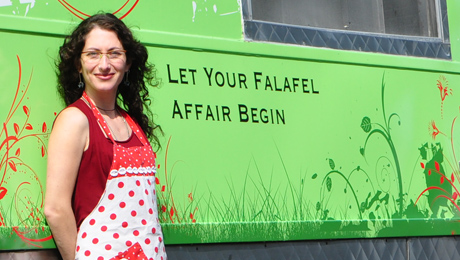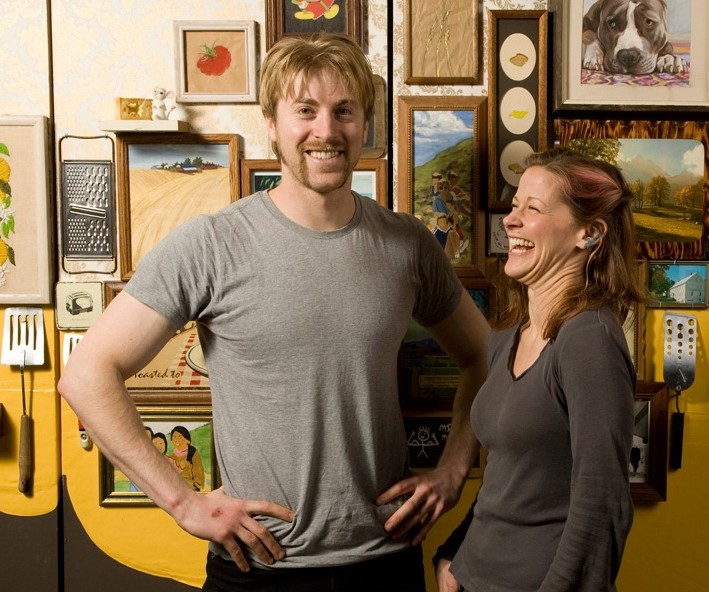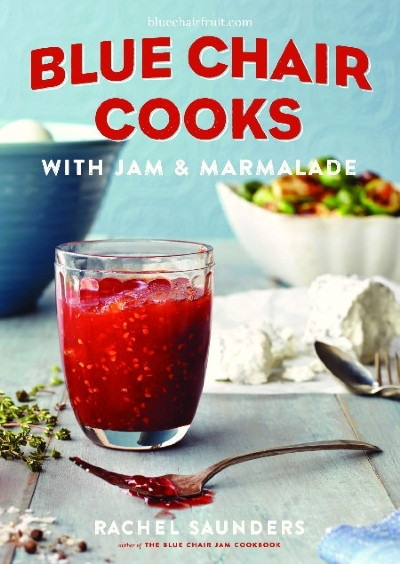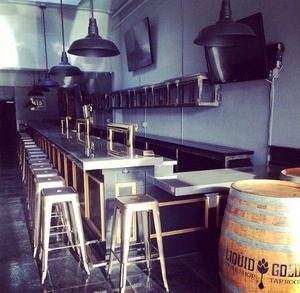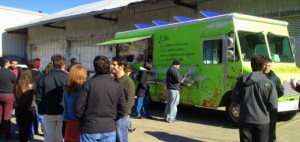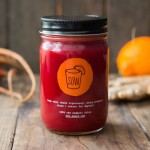The post Food Businesses In the News appeared first on Paul Terry & Associates.
]]>Gail Lillian’s popular food truck business Liba Falafel expanded to a brick and mortar location in Oakland this year. The San Francisco Chronicle recently featured a great review of the business.
Renaissance graduate and teacher Heidi Gibson’s and Nate Pollack’s business The American Grilled Cheese Kitchen has reached a milestone — 1 million grilled cheese sandwiches sold in just a little over four years of business. And they are in the process of expanding again!
Rachel Saunders, owner of Blue Chair Fruit Company has a new book coming out this month — Blue Chair Cooks with Jam and Marmalade! It’s all about how to incorporate fruit preserves into your cooking.
And Renaissance graduate, Tim Lee will be opening Liquid Gold on Hyde Street in San Francisco, the city’s newest bottle shop and tap room. The grand opening was Saturday!
Please join PTA in showing your support for local small businesses and these hard-working, passionate entrepreneurs!
The post Food Businesses In the News appeared first on Paul Terry & Associates.
]]>The post Street Food: A Fresh Start appeared first on Paul Terry & Associates.
]]>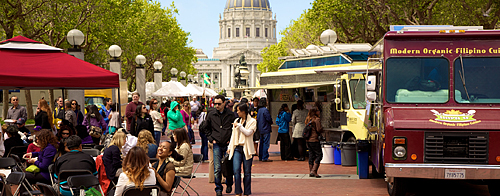
Off the Grid
Last week the San Francisco Board of Supervisors unanimously passed Supervisor Scott Weiner’s food truck reform legislation. After two years of negotiation Weiner was able to achieve a compromise on which both restaurants and food trucks could agree—trucks will now be able to operate on college and hospital campuses and park closer to middle and high schools, but they will have to comply with a 75-foot buffer around brick-and-mortar restaurants.
In his statements last week, Matt Cohen, founder of Off the Grid said, “Every single piece of this legislation was a compromise from both sides. We’re glad about having the process be cleaner, but it’s a wait-and-see approach about how it plays out in practice. I think all stakeholders have that approach at this point.”
Between this new San Francisco food truck ordinance and the California Homemade Food Act, there are a lot of legislative changes affecting local food entrepreneurs right now. The first San Francisco Cottage Food permit was just issued in April to a Dogpatch resident, just a few blocks from my office. It is a different landscape for food entrepreneurs than just a few years ago. Some of my curent clients and students will be impacted by these new laws so I will continue to follow the issues closely.
The post Street Food: A Fresh Start appeared first on Paul Terry & Associates.
]]>The post San Francisco Food Fights appeared first on Paul Terry & Associates.
]]>The current food truck regulations haven’t been working well for either side. If Supervisor Weiner’s new legislation is passed, it would prohibit food trucks from doing business within 50 feet of a restaurant but would also allow food trucks to operate in parts of the city where they’ve been previously banned.
At the PDMA meeting, Supervisor Weiner explained to us that that current rules have made whole areas of the city, including a large portion of the Mission, off-limits to food trucks. He wants to encourage more trucks to congregate in areas like SOMA and the Financial District. The bill would legalize food trucks on all hospital and college campuses and allow trucks to park closer to schools, decreasing the buffer from 1,500 feet down to 500 feet for middle schools and between 750 and 1,000 feet for high schools.
PTA has worked with and taught restaurant owners and food truck owners and we understand the challenges on both sides—the costs, the competition, finding the right location, scalability and market demand. Running a small food business—whether it is attached to one spot or mobile—is very hard work and it is important that our local legislators are listening to business owners’ concerns and supporting small business issues. I appreciate Supervisor Weiner’s efforts to move the conversation forward.
The post San Francisco Food Fights appeared first on Paul Terry & Associates.
]]>The post Home-based Foodies in the Game appeared first on Paul Terry & Associates.
]]>
In January, 2013 the California Homemade Food Act was signed into law, making it legal for people to sell “low-risk foods” produced in their home kitchens. A food entrepreneur who wants to qualify as a Cottage Food Operation must meet a few criteria:
- Produce foods on the approved list,
- Have gross sales this year of $35,000 or less (by 2015 this will go up to $50,000),
- Complete a food processor training course, and
- Have product labels that meet state and federal requirements.
There are more details of course. Note the two categories of cottage food operation:
- Class A operations can only sell directly to the consumer (which can include at community events, farmers’ markets and through CSA subscriptions) and can register with a self-certification compliance checklist.
- Class B operations must be inspected to receive their permit but can then sell to restaurants, retail food stores and food trucks.
Before this legislation became law, you needed to use a commercial kitchen or food processing facility (such as Eclectic Cookery) to legally sell your food product (or join a kitchen incubator, like La Cocina). For many entrepreneurs who are just starting out, testing their food business ideas by renting a commercial facility is cost prohibitive. Now there is a way to start small at home legally.
The success of the now-closed Underground Market in San Francisco is a clear sign of how many people will be able to benefit from this new law and also how many people want artisanal food. With a pick-up in the economy, there should be more customers for a good product… if it is sold effectively and meets the considerations of the target market. It is a great time for micro businesses and home-based entrepreneurs to really test their products, their ability to do the work and their commitment to be small business owners. There’s a lot of new energy out there to support small food businesses and new policies like this Homemade Food Act to stimulate the growth of the industry.
To learn more about the California Homemade Food Act and how to obtain a cottage food operation permit, go to the San Francisco Department of Public Health and the California Department of Public Health websites.
The post Home-based Foodies in the Game appeared first on Paul Terry & Associates.
]]>The post Good Food Dot Com appeared first on Paul Terry & Associates.
]]>There are many new internet tools to support small businesses and many are being created specifically for food businesses. This includes a search engine for food industry jobs (Good Food Jobs), a new entrepreneurial education and online community for mentoring food start-ups (Local Food Lab), an online wholesale service (Buyer’s Best Friend), and a new portal to market and distribute food products directly to consumers (Good Eggs). It is an exciting time to be starting and running a food business!
Many of my students at Renaissance Entrepreneurship Center (graduates of the 14-week Business Planning Class) are taking advantage of these tools. b. street waffles, Black Jet Bakery, Double Dutch Sweets, Leslie Kay Bakery, Mama Tong, Ruby’s Oats, and Sow Juice, as well as two of my clients, Starter Bakery and Suite Foods, are all Good Eggs producers.
For new food businesses, this type of publicity and connection to potential customers is invaluable. Access to markets is key for any small or micro business. Setting up an online store or trying to get into a local retail outlet can be a daunting or competitive proposition.
But if you can prove there is a market, satisfy the marketplace with good services, and build a following through these new online platforms, you just might prove your business model, make it into the mainstream, and develop a sustainable business.
These new internet tools are making it easier for small food businesses to get support, find community and connect with the markets they need to be successful. May they take root and flourish!
The post Good Food Dot Com appeared first on Paul Terry & Associates.
]]>The post Tasty crowd-sourcing appeared first on Paul Terry & Associates.
]]>
jam from Blue Chair Fruit Company
There is now a new crowd-sourcing platform in development specifically for food ventures called yumspring. It is being billed as a place where chefs, bakers, brewers, canners and all other sorts of anti-hunger innovators can connect with people who have an appetite to support new, local, adventurous food entrepreneurs. Check out this 5-minute pitch from yumspring’s founder on food and tech connect, a new blog about the growing food and information technology movement.
The post Tasty crowd-sourcing appeared first on Paul Terry & Associates.
]]>The post Eating Well from Street to Street appeared first on Paul Terry & Associates.
]]>The sunny streets were full of happy people enjoying tasty delights from 85 vendors—including from some of my former students: Gail Lillian of LIBA Falafel, Claire Keane of Clairesquares, Antoinette Sanchez of Endless Summer Sweets, and Neal Gottlieb of Three Twins Ice Cream. What a treat!
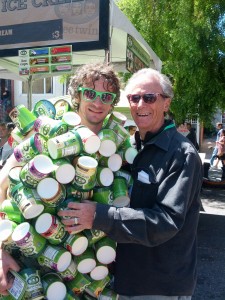
Neal and Paul at SF Street Food Festival
As a small, start-up food business it is a challenge to break into the industry and be successful. Food entrepreneurs can have great ideas and delicious recipes but they also need to afford legal kitchen space and the start-up costs to open their businesses, find a niche, compete for shelf space and break into a crowded marketplace. Motivated entrepreneurs like Gail, Claire, Antoinette and Neal are making it work by renting kitchen space and/or selling out of a food truck. (Neil started very small over 6 years ago and now sells ice cream in almost every state.)
Luckily, food businesses don’t have to jump into business ownership without some support. La Cocina’s non-profit kitchen incubator and programs for low-income, immigrant and women-owned food businesses and Renaissance Entrepreneurship Center’s programs and small business incubator provide valuable training and support. There are other non-profits and businesses sprouting up around the city to help food entrepreneurs and strengthen the local food movement—from the Underground Market and Forage Kitchen, to the new Good Food Merchants Guild and Good Eggs.
City government is also helping to make the climate easier for food start-ups, such as easing regulations for street food vendors and even passing an ordinance to allow community gardeners and city farmers to sell their produce directly to the public on site. And we’re all waiting to see what transpires with the California Homemade Food Act.
It was great to see the success of small street merchants and so many supporters of the Bay Area’s local food movement this weekend. Let’s keep up the support for sustainable food businesses!
The post Eating Well from Street to Street appeared first on Paul Terry & Associates.
]]>The post Food for Thought appeared first on Paul Terry & Associates.
]]>
Do you support your local food vendors, confirm they are local and legal and see that they are there next week and the week after? They are passionate about their wraps, their salsa, their falafel and their cupcakes. And they are a business…they need to be supported and sustained. You buy from them and stay loyal. They are confident to stay in business, track costs and hire people to help them out.
Tiny micro businesses are popping up and sticking to the wall. They are launched with the passion of the cook and helped by the curiosity of the crowd – having fun, being out and eating the organic, sustainable goodies. This is everyone’s business. Help your favorites run like businesses, give feedback, check for quality and service and be supportive with positive word of mouth. Perhaps most will stay in business if they have fun, love what they are doing and become profitable. Wow… making a profit doing what you love…over and over again. Now that is a thought that we can all relish and support.
The post Food for Thought appeared first on Paul Terry & Associates.
]]>